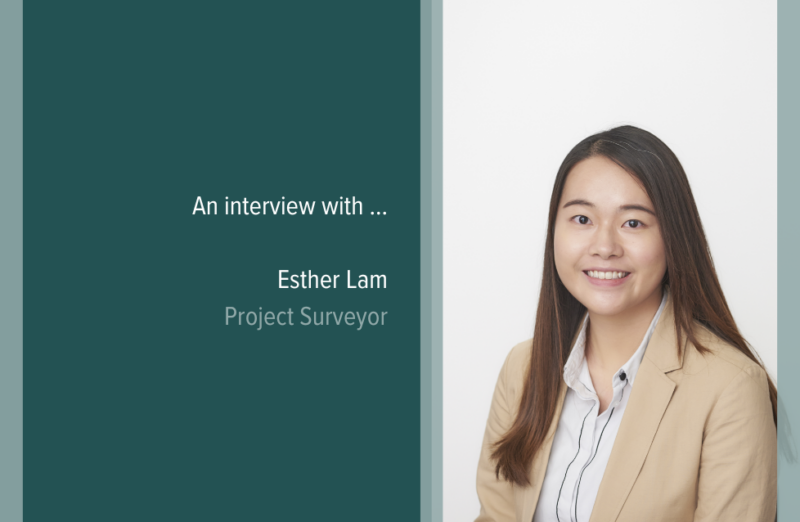In this instalment of ‘An Interview With…’, we speak with Esther Lam, one of our project surveyors, to gain insight into her career journey and the expertise she brings to the industry.
With ever-growing experience in cost management, procurement and contract administration, Esther is at the forefront of ensuring financial and contractual control across projects. We spoke to her about what drew her to surveying, the challenges she’s faced, and her thoughts on the future of the industry.
Tell us a bit about your journey into surveying. What first attracted you to the profession?
Growing up in Hong Kong and surrounded by skyscrapers, I have always had a strong interest in building and the construction industry as a kid. Luckily enough, my dad, who is also a chartered QS, and growing up, would often talk about his day-to-day work, which really got me curious about the profession. I guess you could say it sparked my passion for it—everything from the different types of projects to the balance between office work and being out on site. Plus, the career progression and salary opportunities really stood out to me.
Your role involves managing costs and contracts on complex projects. What do you find most rewarding about it?
For me, the most rewarding part of the job is definitely seeing a project come to life and knowing that I’ve contributed value to the client throughout the procurement process. It’s also really fulfilling to earn the trust of clients and become the go-to person for financial and project strategy decisions.
I was also involved in a voluntary costing exercise that helped Age Concern raise funds, which hopefully led to a better environment for the elderly and those in need in the Southend area. That experience really made me realise that my job isn’t just about spreadsheets and contracts—it’s about making a real difference in society and improving people’s living conditions.
What’s one of the most interesting projects you’ve worked on, and what did it teach you?
I would say the electric vehicle charging project was a real turning point in my career. I had just been promoted and needed to step up and become more independent as a quantity surveyor. It was a great opportunity to take on more responsibility, as I was able to liaise with contractors and report directly to clients. That experience really sharpened my skills and helped me become more confident in managing different relationships on a project while always acting in the client’s best interests. The project also ended up being my case study for the APC process, and it played a huge role in shaping me into a more competent and better Quantity Surveyor.
Surveying often requires balancing multiple stakeholders and priorities. How do you approach these challenges?
Clear contractual obligations are key to preventing conflicts, and it’s crucial that all parties involved understand their roles and responsibilities on a construction project. Personally, I always take an approach that promotes transparency. By actively communicating and setting up the right procedures, I make sure that expectations are managed and risks are properly addressed. As a project QS, my main priority is always acting in the client’s best interests, but it’s equally important to maintain professionalism and integrity. Building trust with stakeholders to ensure smoother collaboration and helps deliver projects that bring real value.
The construction industry is still very male-dominated. Has that presented any challenges for you, and what would you say to other women considering a career in surveying?
There were definitely challenges when breaking into the industry, especially dealing with stereotypes and the blunt, direct communication style often found on-site. I was fortunate to be part of a firm like Leslie Clark, which provided a great support network that encourages sharing experiences. But I think the key to overcoming gender stereotypes is confidence. There will always be friction, especially when it comes to cost agreements and adjudication, but people will respect you when you speak with authority and back up your decisions with facts, rather than shying away from tough negotiations. Consistently delivering results and demonstrating technical knowledge also helps combat unconscious bias, showing that it’s your capability that counts, not gender.
What changes or trends do you think will shape the surveying profession in the coming years?
Digital transformation and AI are definitely the biggest trends in surveying right now. With the increasing use of BIM, AI, and automation, big data is becoming much more accessible to the public, which could potentially change the role of the surveying profession. For a QS, this means it’s essential to embrace digital tools and understand how they work. The key will be knowing how to add value to the data that’s accessible. I think this shift is going to move the profession from traditional QS work to more of a strategic advisor role, going beyond just cost management to also providing strategic advice on procurement, risk mitigation, and commercial negotiation. It’s important for QSs to be able to rely on these tools, process it effectively, and tailor client-specific procurement methods to add real value.
What advice would you give to someone starting their career in quantity surveying?
Mastering the fundamentals is key—tools like measurements, cost estimation, contract law, and procurement are the bread and butter of QS work, and having a solid grasp on these is essential. But beyond that, it’s all about getting as much hands-on experience as possible. Spend time on-site and really understand how construction works in practice. It’s important to see how cost, time, quality, and risk all interact with each other. And most importantly, be proactive and don’t be afraid to ask questions. That’s not only a great way to expand your knowledge but also to build relationships with the people around you.
____________________________________________________________________________________________________
If you want to learn more about Leslie Clark and how we can support your construction consultancy needs, don’t hesitate to get in touch with us – office@lclark.com
